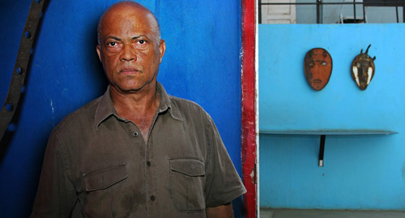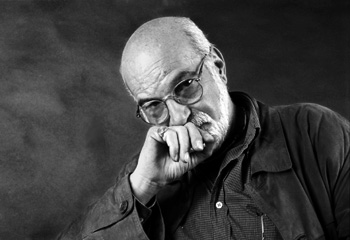
António Ole, an Angolan painter, photographer and film director, was born in Luanda in 1951. He got his degree in cinema from American Film Institute, Los Angeles, in 1975 and in the 80's he studied Afro-American Culture and Cinema at the University of California (UCLA) with a scholarship from Gulf Foundation. His films tackle mainly issues such as colonization, civil war and social problems of contemporary Angola. In fine arts, he dedicates himself to modern painting in which he incorporates some traditional Angolan elements. Ole is one of the most appreciated Angolan artists, with expositions all around the globe. In his filmography the following films are to be mentioned: Os Ferroviários (The Railway's Workers, 1975), Aprender (To Learn, 1976), O Ritmo dos Ngola Ritmos (The Rhythm of Ngola Ritmos, 1978) ...
 António Ole, an Angolan painter, photographer and film director, was born in Luanda in 1951. He got his degree in cinema from American Film Institute, Los Angeles, in 1975 and in the 80's he studied Afro-American Culture and Cinema at the University of California (UCLA) with a scholarship from Gulf Foundation. His films tackle mainly issues such as colonization, civil war and social problems of contemporary Angola. In fine arts, he dedicates himself to modern painting in which he incorporates some traditional Angolan elements. Ole is one of the most appreciated Angolan artists, with expositions all around the globe. In his filmography the following films are to be mentioned: Os Ferroviários (The Railway's Workers, 1975), Aprender (To Learn, 1976), O Ritmo dos Ngola Ritmos (The Rhythm of Ngola Ritmos, 1978) ...
António Ole, an Angolan painter, photographer and film director, was born in Luanda in 1951. He got his degree in cinema from American Film Institute, Los Angeles, in 1975 and in the 80's he studied Afro-American Culture and Cinema at the University of California (UCLA) with a scholarship from Gulf Foundation. His films tackle mainly issues such as colonization, civil war and social problems of contemporary Angola. In fine arts, he dedicates himself to modern painting in which he incorporates some traditional Angolan elements. Ole is one of the most appreciated Angolan artists, with expositions all around the globe. In his filmography the following films are to be mentioned: Os Ferroviários (The Railway's Workers, 1975), Aprender (To Learn, 1976), O Ritmo dos Ngola Ritmos (The Rhythm of Ngola Ritmos, 1978) ...  Ruy Duarte de Carvalho (Satarém, 1941 – Swakompund, 2010) was an Angolan writer, film director and anthropologist. In the beginning of 70’s, he studied cinema in London. After coming back to Angola, he worked for the Angolan TV as a director. He got his PhD in Anthropology by École des Hautes Études de Sciences Sociales in Paris and was professor at the University of Luanda, invited professor at the University of Coimbra and University of São Paulo. He is one of the most important figures of literature and cinema in Portuguese language. Among the years, he dedicated his work to the populations of the Angolan South and joined cinema, literature and anthropology. His work contains of following titles:
Ruy Duarte de Carvalho (Satarém, 1941 – Swakompund, 2010) was an Angolan writer, film director and anthropologist. In the beginning of 70’s, he studied cinema in London. After coming back to Angola, he worked for the Angolan TV as a director. He got his PhD in Anthropology by École des Hautes Études de Sciences Sociales in Paris and was professor at the University of Luanda, invited professor at the University of Coimbra and University of São Paulo. He is one of the most important figures of literature and cinema in Portuguese language. Among the years, he dedicated his work to the populations of the Angolan South and joined cinema, literature and anthropology. His work contains of following titles: 


